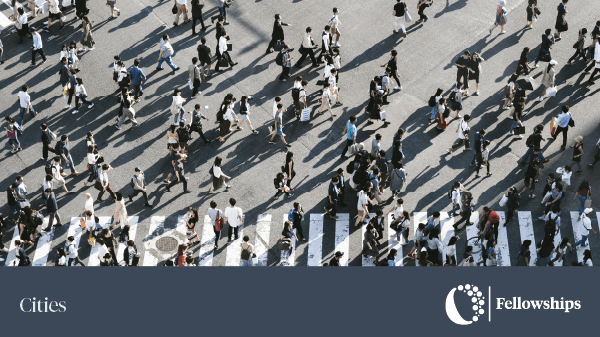Supporting education through teaching fellowships. Established to enhance the debate and learnings of the OBEL AWARD’s yearly themes, the teaching fellowships provide new opportunities for universities and professionals to work together on pressing issues facing people and the planet.


The aim of the OBEL AWARD Teaching Fellowships is to bring the professional and academic realms closer together by supporting professionals to teach in an academic setting. The OBEL AWARD Teaching Fellowships also seek to grant flexibility to institutions of higher education to establish new courses.
The subject matter of each course is related to a theme of a past OBEL AWARD. For 2024, the themes center on cities or adaptation.
The purpose of the fellowships – three designated for the 2024 edition, one each in designated countries in Asia, Africa, and Australia – will support the teaching of new courses within an official program at an accredited academic institution by knowledgeable, practicing professionals with at least 5 years’ experience.
Illustrating the goal of bringing new voices into academia, the applications must be submitted jointly with the individual who will teach the course(s) and the host institution, thus showing dedication to and support of the objectives of the OBEL AWARD Teaching Fellowship.
Three fellowships will be awarded in 2024; one each in (certain countries) Asia, Africa, and Australia. With a grant of up to € 75,000 each, for teaching to begin in 2025.
The joint online application (please see online application) from a university (faculty, school, or department) and the potential teaching fellow, must be related to one of the themes of recent OBEL AWARDs:
- Seminal solutions to the challenges facing cities, or
- Adaptation as related to coastal resilience.
The following fellowship goals should be considered:
- To encourage curiosity in students about the major issues facing architecture as reflected in the themes of the OBEL AWARD.
- To assist academic institutions in creating relevant and impactful content and pedagogies.
- To provide opportunities for academic institutions to explore new themes and include new voices on their faculty.
- To bring the professional and academic realms closer together through collaboration and the Fellowships.
- To provide an opportunity for professionals with at least five years’ experience to take time off from regular duties to teach and share their knowledge through course(s) they have developed.
- To seek to create a community/network around the themes of previous OBEL AWARDs.
Important parameters:
Ideally, the potential fellow should lead/teach two courses at the university within the fellowship period in accredited university programs. However, other models of learning could mean that only one more intensive subject is taught and therefore eligible for a fellowship.
Usually, the academic institution will sign a Memorandum of Understanding (MOU) agreeing to accept the fellow as a visiting scholar/guest teacher or professor and administer the fellowship funds on his/her behalf according to the budget submitted and approved in the joint application. However, the Foundation understands that different local customs and legal parameters may require the disbursal of funds in an alternative manner. The H.F. Obel Foundation is flexible in this regard and is most concerned with the creation and imparting of an impactful course(s), the commitment and agreement of both the potential fellow and academic institution to this joint project and an ability of both to be responsible for the new course(s) and the correct and transparent use of OBEL funds.
The funds are NOT to be used for student trips, student stipends, or promotional publications.
Teaching fellows are expected to remain in the city/region of the university or academic institution for the duration of the course(s), not fly in and out for classes. Please see ADDITIONAL INFORMATION below for the list of eligible countries for host institutions.)
The final report of the fellow, including the curriculum of the course, will form part of a library and will be able to be consulted by other teachers and institutions.
Questions about the fellowship and application procedure may be submitted to fellowships@obelaward.org by 1 July 2024. We will reply to all questions directly but may use your question to update the FAQs posted on our website.
The joint application from a university (faculty, school, or department) and the teaching fellow, and must be related to one of the themes:
1) Seminal solutions to the challenges facing cities.
2) Adaptation as related to coastal resilience.


